Practicing Harp Happiness
#248: Answers to Your Questions: Relaxed Playing and Tuning By Ear
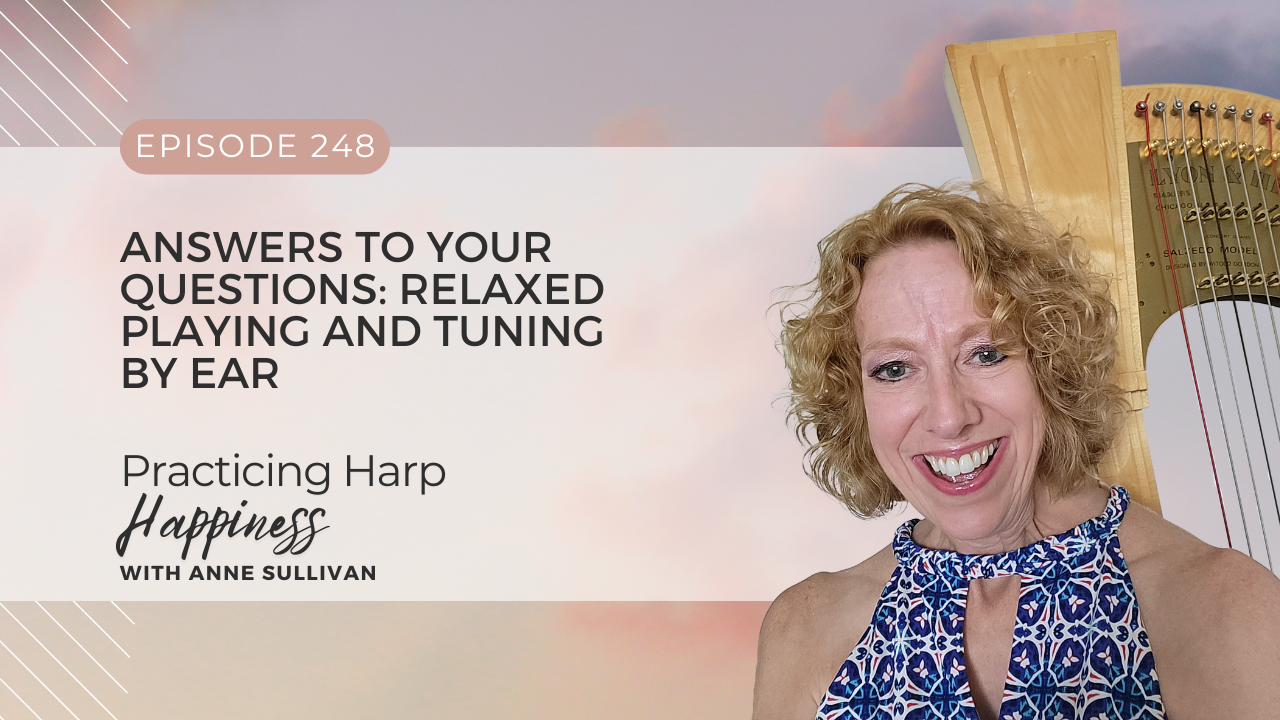
It’s time for another “Answers to Your Questions” episode. I love these episodes because I get to speak to topics that are on your mind, rather than just talking about topics I think you want to know more about. And we have two really great questions to talk about today.
Before I tell you what those questions are, I want to say that my personal criteria for choosing these questions is when I have been asked the same question by three or more people in a relatively short time frame. Usually the questions come in response to something I’ve talked about in the podcast, like our first question today, or something we discussed on one of the Live Monday Warm-Ups. Today’s second question came up on a recent warm-up.
My feeling is that when three people have asked it, there are a bunch more harpists who would have liked to ask it but didn’t. And so I know that there are lots of harpists who really would like to have the answer, even if they let someone else ask the question. So if you’re ...
#247: How Not to be a Control Freak Harpist
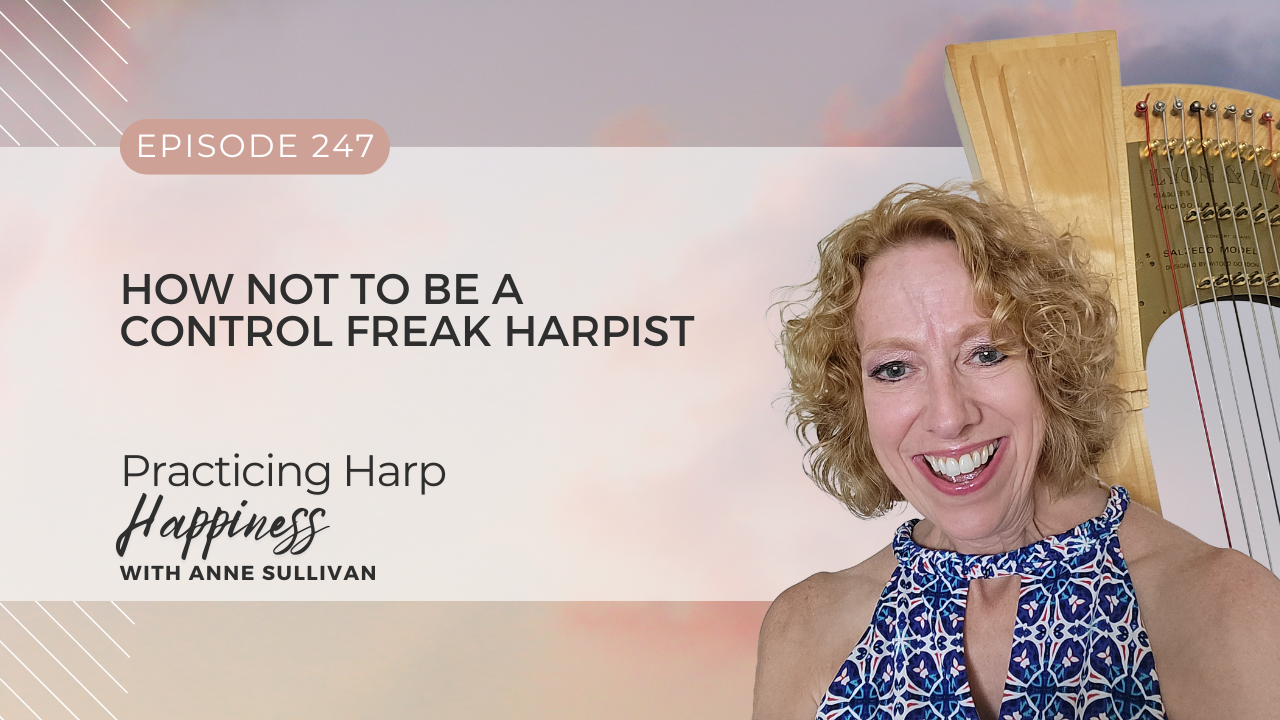
Today we’re talking about control. Control is a word that comes up a lot in our harp playing, whether it’s about controlling our fingers, our dynamics, tempo, tone, focus, or a hundred other relevant things. It feels like we’re always trying to gain control over something in our playing, or over ourselves.
But the path to mastery isn’t about asserting control; it’s actually about letting go of control.
If you search, you can easily find dozens of books that explore the idea of control in music, and nearly all of them start out with the idea - sometimes it’s even written in the title - that we gain control by letting go. It’s a simple enough concept, but it comes with a big paradox: letting go of control essentially requires us not to do what we’ve been training ourselves to do. For example, we train ourselves to play the right notes, which usually requires a lot of focus, concentration and sometimes sheer willpower, in other words, control. But if we don’t let go of that control...
#246: Next Level Repertoire: Turning Baby Steps into Giant Strides
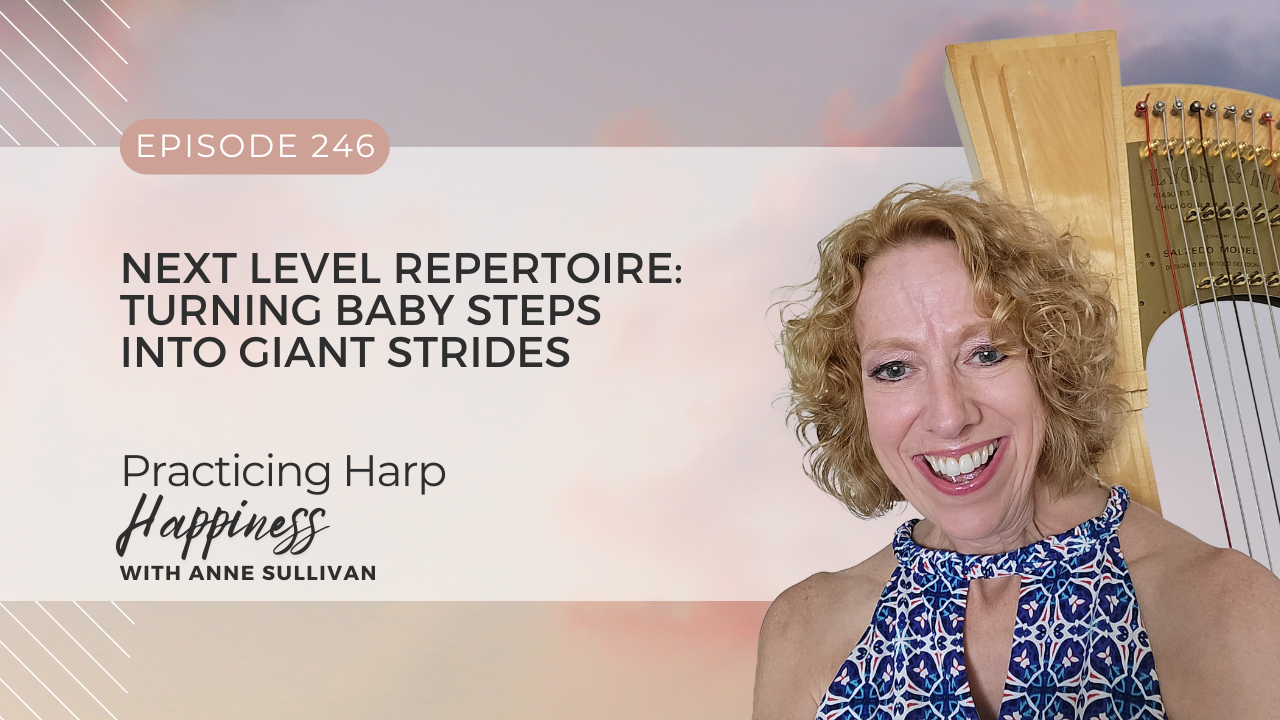
Have you ever started learning a piece that seemed like it should be relatively easy to learn, and then discovered it was actually much harder than you thought? Of course you have; it happens to all of us.
In this situation, we have a choice. We could persist, digging our heels in and fighting our way through the piece anyway. Or we could put the piece aside for the time when we are ready for it. (By the way, that time only comes when we are very focused on leveling up our skills.)
Neither choice feels good, mainly because we feel like we aren’t growing. We feel like our playing is staying at the same level. In fact, one of the reactions I see from harpists in this situation is that they choose to put aside the challenging piece and play another piece by a composer or arranger whose works they know they can play easily. Unfortunately, this can mean that the music they’re playing and the finger patterns they are learning don’t stretch them at all, but actually keep them stuck in t...
#245: Next Level Musicianship: The Sensory Triangle
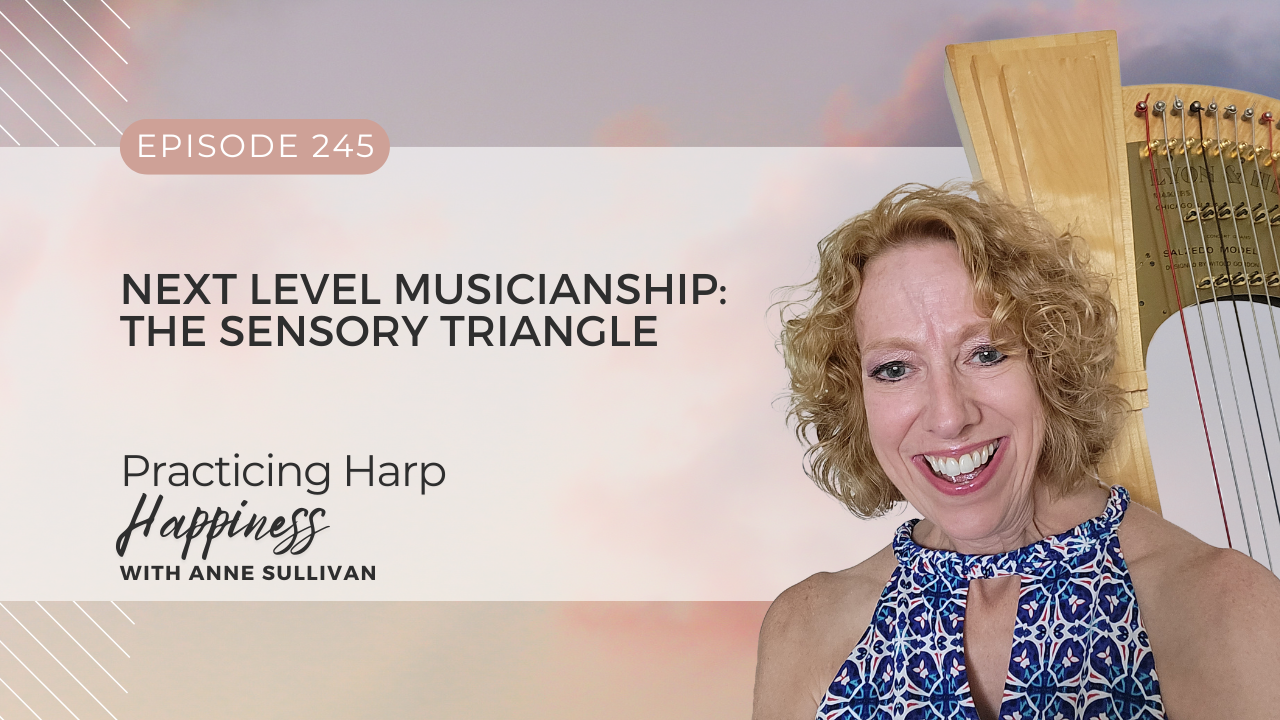
If you’ve listened to me for a while or taken any of my classes or workshops, you know that I love finding the solutions to problems we harpists face and creating the step by step plans to take action to solve them. I’ve discovered over my years of teaching that it’s not hard to define the problem, at least the surface problem. For instance, if your left hand can’t play the notes in two specific measures of your piece, then that’s the problem, and the solution is easy: drill the notes.
Sometimes, however, the real issue lies a few layers down. Maybe the reason the left hand can’t play those measures isn’t the notes. Perhaps there is a technical issue, or maybe reading bass clef is the sticking point. It could be a counting issue or even not quite understanding what the meaning of the music is at that moment. So when I’m working with my Gold Circle students, we often spend some time digging a little deeper to see where the real issue is. Then we can define the proper steps to addres...
#244: Next Level Technique: 3 Myths You Need to Bust
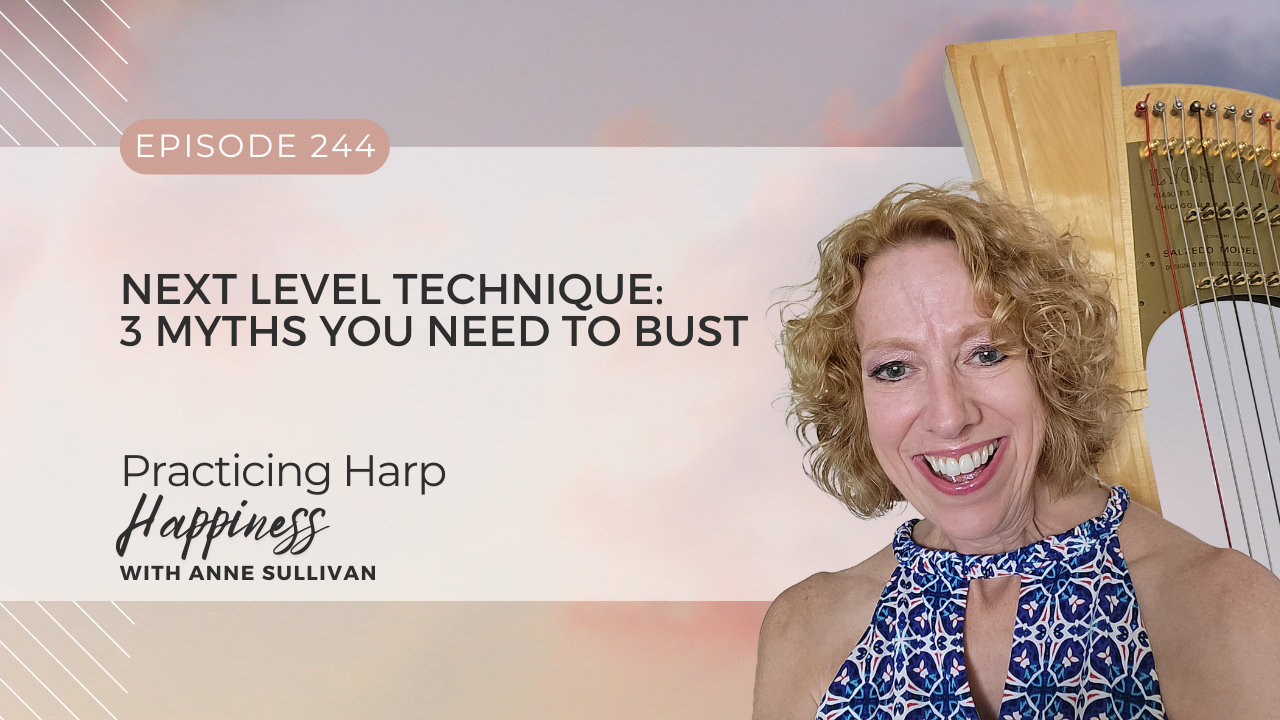
If you heard last week’s podcast, you may remember that this month’s podcast episodes are all about growth, your growth as a harpist and the systems and skills that are necessary for that growth.
Last week, we talked about three key systems that you need to have in place for growth. This week is all about technique. I know it may sound like a dry as dust topic to some of you. Harpists generally fall into two distinct camps: those who hate doing technique exercises and those who love them. So if you love your Grossi and LaRiviere or whatever exercise book you use, this podcast is going to be right up your alley. We’ll dive into how you can use what you’re doing now to get to that next level of technical proficiency.
If you’re in the other camp, one of those who feels like exercises are torture when all you want to do is play pretty pieces, I hear you. I’m talking to you as a convert. Granted it was many years ago when I finally realized that exercises weren’t just for solving prob...
#243: Architect Your Harp Playing Growth with 3 Key Systems
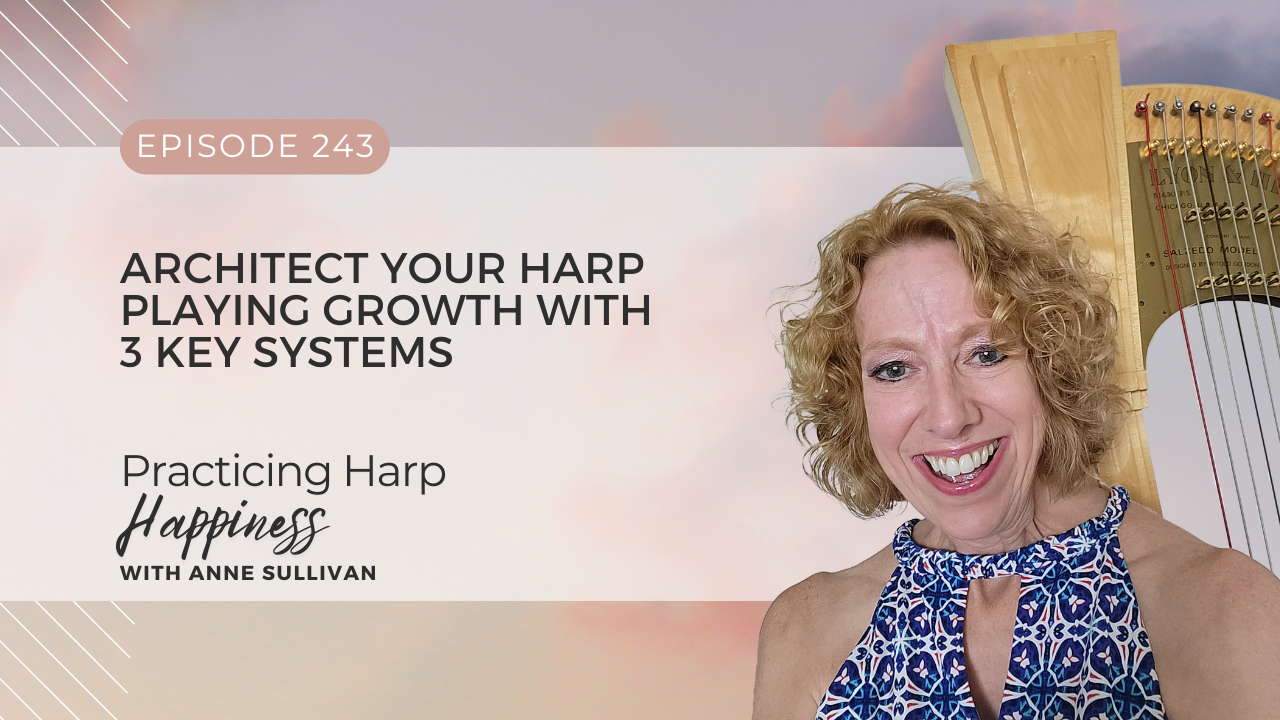
A system is comfort. When we have and follow a system, whether it’s for completing tasks, or crafting, or making a grocery list, our mind can be at ease. Why? Because we know we have the steps to complete our task, and all we have to do is to follow the steps and the task will be done.
When it comes to harp playing, people frequently make one of two mistakes. One is thinking that harp playing is inherently creative, and therefore a system is not only unnecessary, but it will rob your music of its soul. The other is trying to systematize everything about your playing in an attempt to get consistent results or make consistent progress.
If you heard last week’s podcast, you know that the word “progress” is one of the words I’m trying to steer clear of this year, but it is one I am going to find hard to avoid. What’s interesting, though, is that systematization is one of the “progress” traps. Progress, meaning in this case growth either overall growth or integration of a single piece...
#242: My New Vocabulary for 2026
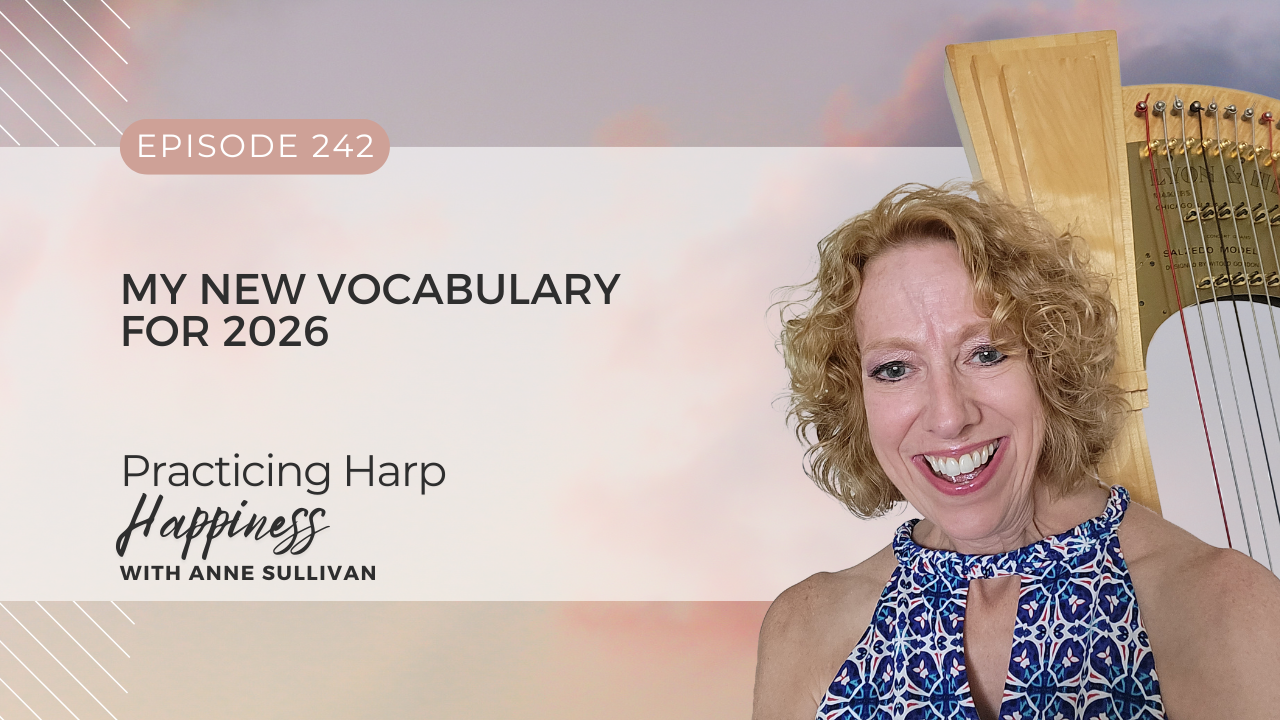
For me, and I think for many people, this last week of the year is a supremely hopeful one. The rush to get ready for Christmas is behind us and the promise of a new year is finally in focus. We’re faced with possibilities for a change, instead of pressure.
I realize, of course, that for many of us those possibilities for the new year include uncertainty, worry and fear which are beyond any assistance I could give on this podcast. I can merely offer prayers that the universe grants us all the courage and resources we need to face the circumstances before us. And I will stick to what I know best, how to help you find more meaning, joy and fulfillment in your harp playing,
It has become a fairly wide-spread practice at the beginning of the year to choose a word or a phrase to be your touchpoint throughout the year, to inspire you, motivate you and keep you focused. As I was thinking through my word for 2026, I realized that many of the words I have been using frequently in my teachi...
#240: Classics for a Relaxing Holiday
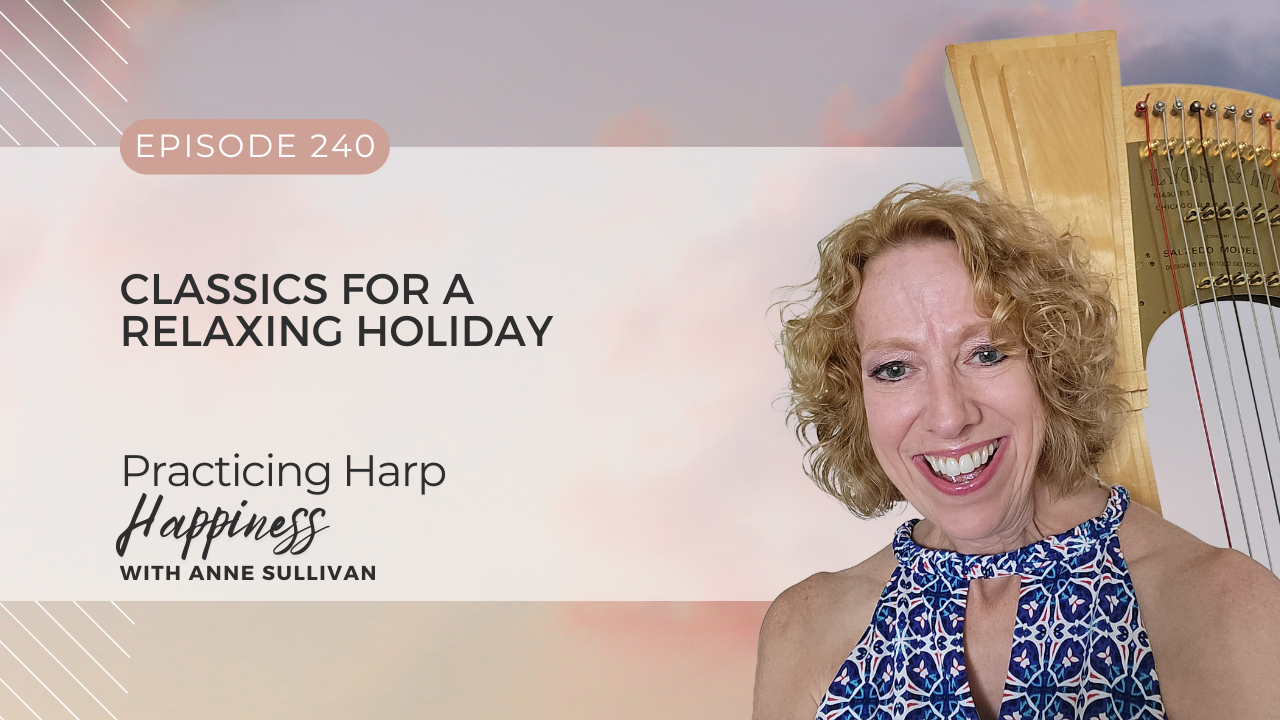
It’s Christmas week, and for me, this is a week to finally settle into the holiday mood. This is the time we decorate our tree, get in touch with friends and family, and start reveling in the spirit of joy and peace that feels so elusive other times of the year.
So this is not the week I want to dive into a heavy teaching topic here on the podcast. What I want to do today is spread a little holiday harp happiness with a short musical program for you to enjoy.
The theme of the program is “Classics for a Relaxing Holiday,” classical music that is appropriate for the holidays, but isn’t specific to this time of year. In other words, no jingling bells or Santa Claus songs - just calm, perhaps even meditative harp music, assembled from my various recordings and videos.
I’ve listed the program in the show notes, and for some of the pieces, you’ll also find links to sheet music arrangements in our Harp Mastery® shop. I’ve also included spoken introductions to each piece to give you a ...
#239: The Stories Behind the Songs: Three Carols Revisited
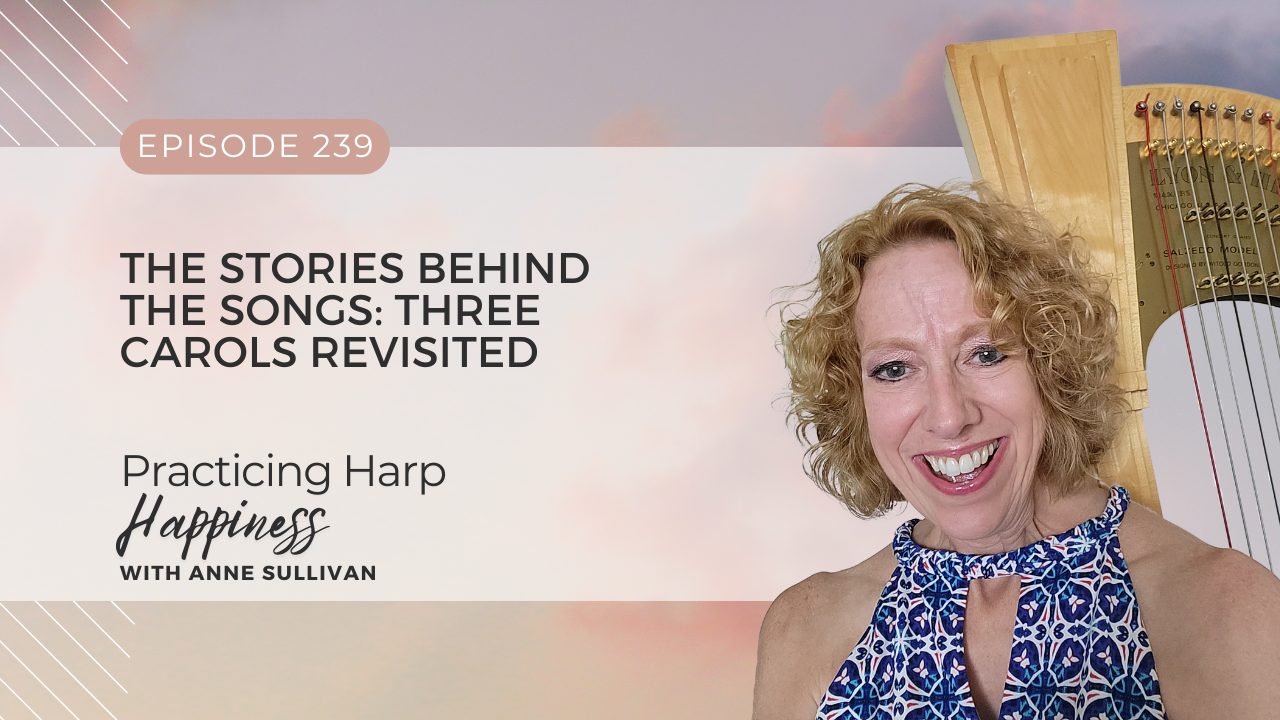
I’m kind of a Christmas carol geek, if there is such a thing. I’ve always enjoyed playing them and even as a young person, I was fascinated by where they came from: their origins, translations, composers, text sources, etc. For me, the stories behind the carols were a kind of history and geography lesson rolled up into the magic and meaning of Christmas.
I think the origin stories are what really held my interest. The writing of “Silent Night” because a church organ in Austria was damaged, or the composition of “O Holy Night” as a dedication piece to a renovated organ in France are stories that aren’t just interesting, though. They shape how I think about those songs and how I play them, certainly how I arrange them as well.
Today, I want to share the back stories to three carols. I know you’re familiar with these carols, but you may not be familiar with their origin stories. If you’re like me, you love hearing insider scoops and these are back stories you probably won’t hear anyw...
#238: How Purpose Fuels Progress: The Map You’ve Been Missing
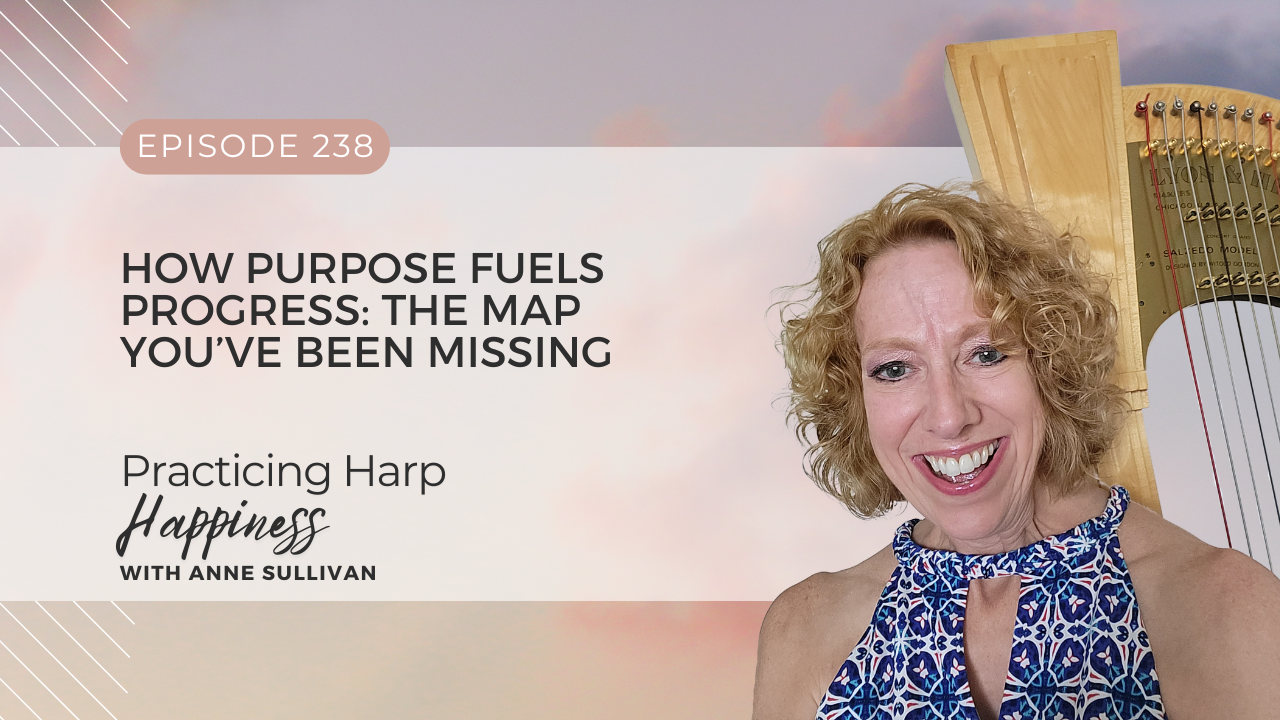
My first ocean cruise was a cruise from New York City to Bermuda. I’d never been on a big ocean liner before. Although I’ve done a couple other ocean cruises since then, I’m not really a fan. I love exploring, and there is only so much exploring you can do on a ship in the middle of the ocean.
But on this first cruise, I did love the feeling of being in the middle of the vastness of the ocean with nothing but water all around. The feeling of not having any landmarks - literally - was a little exhilarating and more than a little awe-inspiring. Naturally, I wasn’t really frightened; I assumed, logically and correctly, that the captain and crew knew where we were heading and how to get there. I myself wouldn’t have had a clue, but I never doubted that I could rely on them to get me safely to Bermuda and back.
Nautical navigation is a mystery to me, and I was impressed by the notion that all the power and energy of the ship would have been useless if the captain hadn’t set a direction...

